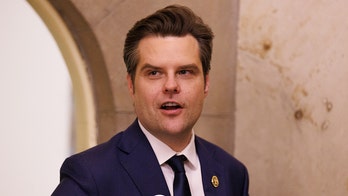
House Oversight and Government Reform Committee Chairman Rep. Darrell Issa, R-Calif. , speaks on Capitol Hill in Washington, Thursday, June 2, 2011,
Rep. Darrell Issa, the powerful chairman of the House Oversight and Government Reform Committee, has declared war on the New York Times after the newspaper published a front-page story last week linking the California Republican’s business activities to his congressional duties.
The story, “A Businessman in Congress Helps His District and Himself,” claims that Issa has used his congressional power to further enrich himself.
“As his private wealth and public power have grown, so too has the overlap between his private and business lives, with at least some of the congressman’s government actions helping to make a rich man even richer and raising potential for conflicts,” New York Times reporter Eric Lichtblau wrote.
Issa didn’t participate in what he calls a “false story,” but has launched a full-scale campaign pressing for a front-page retraction after his staff cited 13 errors, including the lede of the story that claims Issa’s district office building overlooks a golf course.
So far, the newspaper has issued three corrections.
The first one came one day after the story was published for what Lichtblau said was typo. Instead of saying Issa split a holding company into separate multibillion-dollar businesses, he meant to say “multi-million.”
But Issa disputed as “wildly inaccurate” three specific examples cited by Lichtblau, including the value of a medical complex that Issa purchased in 2008 rising 60 percent “at least in part because of the government-sponsored road work” that Issa supported. And that he “went easy” on Toyota during hearings last year on unintended acceleration due to “his electronics company’s role as a major supplier of alarms to Toyota.”
“The request for a full front page retraction is based on numerous errors that invalidate the primary assertions made in the story that is a false and sensationalized account of Rep. Issa’s efforts to conduct congressional oversight of the Obama administration and other matters,” Issa spokesman Frederick Hill wrote in a letter to New York Times editors last Friday.
While the newspaper reviewed the request, Issa’s office posted a blog Tuesday questioning the integrity of Lichtblau, a Pulitizer Prize winner, comparing him to the infamous Jayson Blair, who was caught plagiarizing and fabricating numerous stories in a highly publicized scandal in 2003.
The blog cited multiple sources, including The San Diego Union-Tribune, disputing Lichtblau’s description of Issa’s office building overlooking a golf course, and the apparently inconsistent explanations from Lichtblau and his editor.
In an email to Issa’s office after the story was published, Lichtblau pointed to the leasing agents citing views of a golf course in their advertisement. But Dean Baquet, the newspaper’s Washington bureau chief, told Politico that the story didn’t imply Issa’s office overlooked the golf course.
“I don’t think it implied – at least to my mind – that Issa’s office overlooked the golf course,” he said. “I think it is trying to give a sense that this is a building in a cool area. That’s the way I always read it. Otherwise it really would have said his office overlooked the golf course. That would have been even cooler to say.”
In a letter to Issa on Thursday, Baquet said the newspaper had finished its review and would issue two more corrections: one for stating Issa made $357,000 off the sale of a mutual fund in 2008 when he actually lost $125,000. And another for the medical office complex, whose property value remained the same after Issa secured federal funding to widen a road alongside the plaza. Baquet blamed inaccurate public records for both errors and continued to defend the story.
“The article was carefully reported, written, and edited, and we stand by the story both in its broad thrust and, except as noted, in its particular details,” he wrote. “We do not believe a retraction is warranted.”
Baquet concluded his four-page letter by taking a swipe at Issa for launching his campaign against The New York Times.
“Finally, I’d like to say that it is troubling to see your office using the letterhead and imprimatur of a powerful congressional committee to wage personal and meritless attacks on a reporter and a news organization,” he wrote.
Hill replied to Baquet on Friday, saying the three corrections are “steps in the right direction.”
“However, The Times’ continued refusal to accept clear evidence of other mistakes, your unwillingness to retract a deeply flawed story even after acknowledging that factual pillars of the article are incorrect, and your failure to address or defend the conduct of the story’s author is deeply disappointing and makes your response to the issues raised by our office and others inadequate,” Hill wrote.




